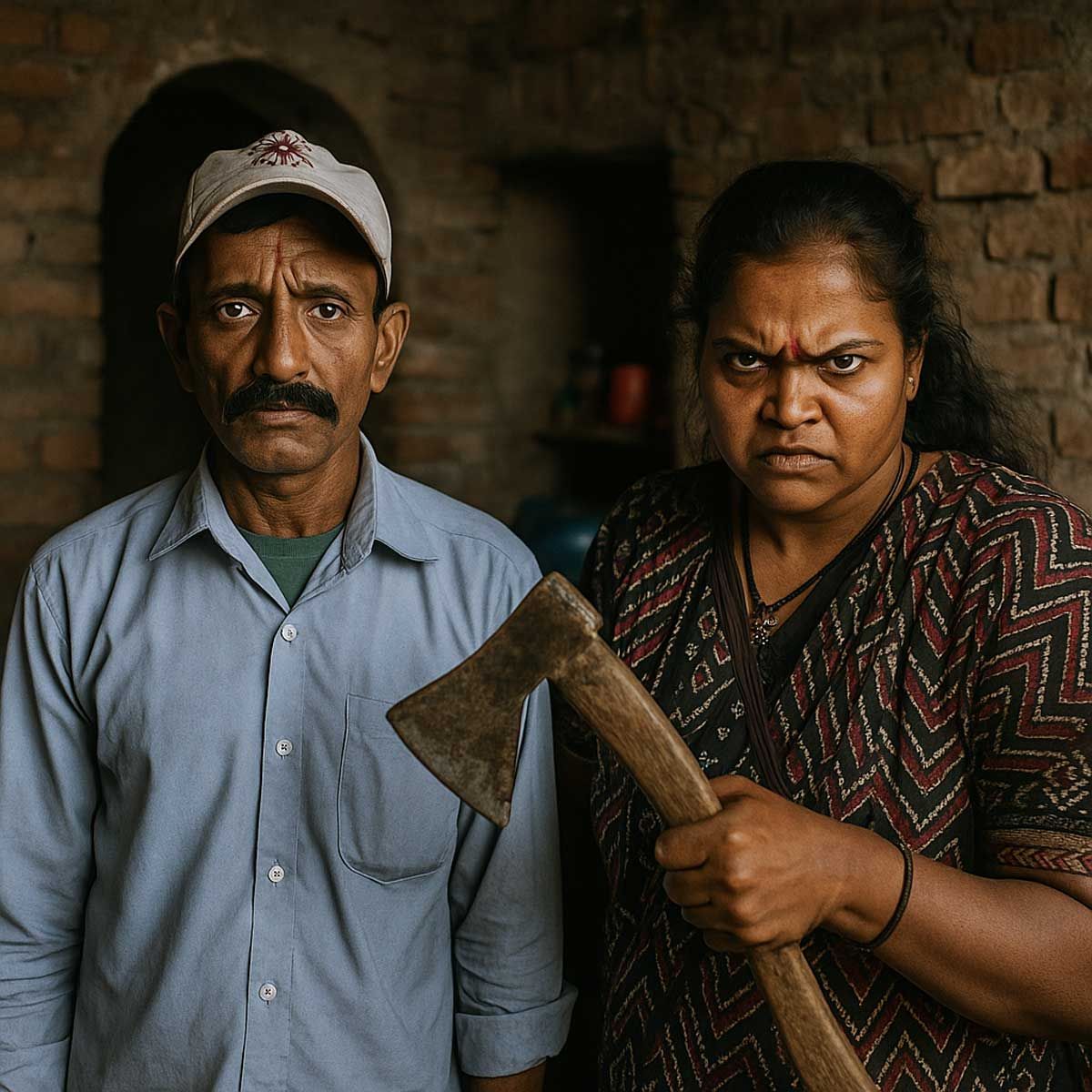More Coverage
Twitter Coverage
Satyaagrah
Written on
Satyaagrah
Written on
Satyaagrah
Written on
Satyaagrah
Written on
Satyaagrah
Written on
JOIN SATYAAGRAH SOCIAL MEDIA
"Oops, Jindal did it again": Jindal Uni discusses ‘Destroy Ram Mandir, erect Mosque’ during a talk on ‘Brahmanical Hindutva Fascism’ igniting a controversy with anti-Hindu rhetoric, protests against CAA & Pulwama tributes underscore deep ideological rifts

On February 7, a significant stir was caused by an event at OP Jindal Global University in Haryana, organized by a group known as the Revolutionary Students League. The gathering led to widespread shock due to its anti-Hindu sentiments, troubling interpretations, and extreme suggestions including the destruction of temples.
|
The focus of this event was a session named “Ram Mandir: A Farcical Project of Brahmanical Hindutva Fascism.” The organizers critiqued the January 22 ceremony of Ram Lalla's Pran Pratishtha at the Ayodhya temple, condemning it as a display of what they claim to be the violent and exclusionary essence of a Brahmanical Hindutva fascist approach. They believe that the Ram Mandir project is now a symbol of aggression against Muslims and Dalits in India, reflecting a wider pattern of turning educational environments towards saffronisation.
The group organizing this event, which used to go by the name Sangharsh and now calls itself the Revolutionary Students League, suggested attendees read “Fight Brahmanical Hindutva Fascism” by Varavara Rao. This reading material, mentioned in the event's pamphlet, is known for its contentious viewpoints.
A recent event at OP Jindal Global University has sparked a massive outcry, drawing criticism for its perceived anti-Hindu messaging. The event, criticized for its inflammatory language and calls for the destruction of Hindu temples, has thrown the university into the center of a heated debate. The community and broader academic circles are calling for the university to take responsibility for the controversial messages shared during this gathering.
The event's discussions have been particularly contentious, touching on highly sensitive topics. For instance, the narrative began with, “The killings of Mohammad Akhlaq, Prof. M M Kalburgi, and Yakub Memon have come to symbolise in many ways the prevailing situation in the country under Modi-led BJP-rule. Akhlaq was bludgeoned to death at his Dadri home in September by a lynch mob that was instigated, mobilised and led by a bunch of Sanghi goons after maliciously spreading the rumour of beef-eating.”
Furthermore, the dialogue continued to highlight cases perceived as injustices, “Prof. Kulbargi was shot dead by unidentified Hindutva-fascist assassins because of his consistent and irrepressible opposition to their designs in Karnataka. Memon was hanged this July in Nagpur jail after his conviction in the 1993 Mumbai blasts in a travesty of justice. For the self-appointed gendarmes of the ‘Hindu Rashtra’, to eat something of one’s choice is anti-national, to voice dissent is anti-national, to be even the brother of a Muslim who is accused of so-called anti-national activities is anti-national- ‘crimes’ that are punishable by death according to the Manuvadi Hindutva-fascists.”
|
These statements have ignited a storm of controversy, with many viewing the event as a platform for spreading anti-Hindu propaganda. The detailed referencing of these incidents aims to criticize what is perceived as a pattern of behavior and policy under the current government, sparking a broader debate on freedom of expression, secularism, and the role of universities in political discourse.
In addressing the content of the article associated with the event at OP Jindal Global University, it is crucial to critique the narrative presented, particularly in its portrayal of the BJP government and the broader implications of such discussions within academic contexts. The event and the subsequent article have stirred controversy by advancing a perspective that many see as not only unbalanced but also unjustly critical of the current government and its supporters.
The article asserts, "Whether the execution is carried out judicially by the state or by any of the numerous murderous gangs raised by the hydra-headed RSS, it makes little difference to the person at the receiving end. These killings (and those of Govind Phansade and Narendra Dabholkar earlier) are but a few of the more talked-about incidents in what has become a continuous barrage of attacks carried out in many forms by the Hindutva-fascists across the country". Such statements, deeply critical of the RSS and indirectly implicating the BJP government, present a one-sided view that disregards the complexity of India's socio-political environment and the government's efforts to ensure justice and security for all its citizens.
Further, the article comments, "Particularly since the BJP government came to power, such attacks are taking place almost on a daily basis. Though termed by some as ‘intolerance’, this is part of an all-round attack by the Brahmanical Hindu fascist forces against the people, affecting all spheres of their lives." This perspective paints the BJP-led government in a monolithically negative light, failing to acknowledge the multifaceted and often challenging realities of governance in a diverse and populous nation like India. The use of terms like 'Brahmanical Hindu fascist forces' is not only divisive but also undermines the democratic mandate that the BJP government holds.
Moreover, the assertion that "These attacks are simultaneously ideological, political, social, religious, ethnic, economic, cultural, juridical, and environmental—carried out with violent and non-violent, legal and illegal, constitutional and extra-constitutional means," attempts to cast a shadow over the entirety of the BJP's tenure by suggesting a coordinated assault on the fabric of Indian society. Such broad and sweeping accusations overlook the government's initiatives aimed at economic development, social welfare, and national security, which have positively impacted millions of Indians.
|
By promoting a narrative heavily critical of the BJP government and framing its actions within a context of religious and cultural intolerance, the event at Jindal University and the associated article contribute to a polarized discourse that does not reflect the nuanced realities of India's political landscape.
According to one author's assertion, on the target of Hindutva forces are all kinds of dissent and non-submissiveness, particularly the fighting organisations and individuals—revolutionary, democratic, secular, and patriotic—as well as Muslims and Christians, Dalits and Adivasis, women and people of other oppressed genders, oppressed nationalities, and even sections of the parliamentary opposition.
The discourse took a further critical turn when it was concluded that, "In fact, anyone who refuses to fall in line with their Hindutva agenda or opposes their fascist diktats is a potential target. Indeed, at a time like this when the assault of the Hindutva fascists is becoming increasingly conspicuous in all spheres of society and the state, one cannot be faulted for wondering if a vast section of our people are already made to live in the shadows of a veritable ‘Hindu Rashtra’." This perspective starkly contrasts with the government's vision of 'Sabka Saath, Sabka Vikas' (Together, for everyone's growth, with everyone's trust), aiming to bring about a harmonious and inclusive growth for all communities within the country.
The narrative of OP Jindal Global University hosting anti-national and anti-Hindu events is not a new development. The institution has previously been in the spotlight for organizing events that critics claim fuel divisive sentiments rather than fostering a spirit of unity and understanding among India's diverse populace. The recent filing of a First Information Report (FIR) against Professor Sameena Dalwai for alleged harassment of students and privacy violations adds to the controversy, highlighting concerns about the university's commitment to maintaining a respectful and safe academic environment. The incident involving the alleged display of students' profiles on a dating app within a classroom setting raises serious questions about privacy and ethics in educational settings.
These developments at OP Jindal Global University underscore a growing concern among many about the role of academic institutions in political discourse. While universities are places for free thought and expression, there is a pressing need for balanced and respectful discussions that contribute positively to the nation's democratic fabric and social harmony. Critics of the university's recent activities argue that fostering an environment that seems to exclusively critique and oppose the BJP government and its policies, without providing a platform for open and constructive dialogue, does a disservice to the academic community and the country at large.
In September, an alarming incident involving Professor Sameena Dalwai was reported, where she allegedly accessed a student’s Bumble dating app account during a class, and then projected the details onto a Smart TV for all students to see. This intrusion into a student's privacy was compounded by shared video footage and screenshots on social media, showing the professor discussing the dating account, which was said to belong to one of the students. It was further reported that when students hesitated to reveal their profiles, "Dalwai encouraged them to create fake identities, even suggesting the use of Congress leader Rahul Gandhi’s image." This act not only breached privacy norms but also raised ethical concerns regarding the behavior expected from educators towards their students.
Adding to the string of contentious events, on November 1, the university hosted a lecture by Professor Achin Vanaik titled ‘The History and Politics of the Palestinian Present’. Vanaik, a retired professor of International Relations and former Head of the Department of Political Science at the University of Delhi, is known for his extensive work. However, the lecture quickly became the subject of controversy as video clips surfaced online, showing "alleged antisemitic and anti-Hindu remarks" made by Vanaik during his talk. Moreover, he faced criticism for his comments "criticising the Modi government’s stance on the conflict in Palestine." This incident not only sparked debates around academic freedom but also highlighted the fine line between critique and disrespect for religious sentiments and national policies.
Furthermore, on February 8, 2023, an event organized by professors and students of JGU featured a screening of the BBC’s two-part documentary “India: The Modi Question,” despite its ban in India. This documentary has been at the center of significant controversy for its "perceived bias against India’s Prime Minister Narendra Modi," with critics pointing out the BBC’s apparent agenda. The decision to screen such a documentary at the university has added to the ongoing discourse on the limits of academic freedom and the responsibility of educational institutions to foster a respectful and unbiased examination of political figures and events.
In 2021, Prof. Shruti Pandey, an Associate Professor at JGLS, made thought-provoking comments during an online lecture. She referenced her professor, Upendra Baxi, saying, "My professor Upendra Baxi, who taught in the law school, used to say that every Hindu practices untouchability... Initially, when he said that, I didn’t think so... But it is true, guys. Go back and look at yourself and how you practice untouchability in quiet, invisible ways that we don’t even understand." She didn’t stop there but further asserted that untouchability is a pervasive practice among Hindus, suggesting that "every Hindu practices untouchability and alleged that Hinduism exists due to untouchability."
Additionally, while discussing religious practices related to widow remarriage, Prof. Pandey contrasted Hinduism with Islam, noting, "We know that this is definitely something where Hinduism has a special rule because widow remarriage is much more acceptable in Islam. And sorry for those of you who believe that Islam is an inferior religion because this is one of the ways in which it shows that it is not." Through her remarks, she praised Islam for its acceptance of widow remarriage, positioning it as more progressive in this aspect compared to Hinduism.
In a separate lecture, Prof. Arijeet Ghosh, an Assistant Professor at JGLS, expressed controversial opinions regarding the status of Jammu and Kashmir. He openly shared his separatist views, stating, "Yes, it has never happened and that is why Kashmir always remains a contentious issue... And if you want my opinion, I call Jammu and Kashmir to be India-occupied-Kashmir although India tries to say it is Indian territory and Indian-administered-Kashmir. I’ll definitely think it is an aspect of occupation, which is what Kashmiris also say." Ghosh’s statement challenges the official stance of the Indian government on Jammu and Kashmir, adding to the debates around the region's political status.
In an extension of his previous remarks, Prof. Arijeet Ghosh, addressing the sensitive topic of Kashmir, refrained from delving deeply into the political complexities, acknowledging the emotional dimensions associated with the region. He mentioned, "I am not going into that, it is an emotive issue, right? We see Sunny Deol screaming on the border saying ‘doodh mangoge to kheer denge, Kashmir mangoge to Cheer denge’… There is a lot of emotional aspect to Kashmir, and hence I am not going into that." This comment, while attempting to sidestep the political quagmire, nevertheless underscores the deeply felt sentiments surrounding the issue of Kashmir in India.
The university also became a platform for expressing opposition to government policies, as seen on February 27, 2020. During this time, what were described as left-liberal ideologues at JGU organized a protest against the Citizenship Amendment Act (CAA) and National Register of Citizens (NRC) at the flagpole area. The event was marked by the display of "derogatory posters with statements like ‘mere room me suttee hai, Modi-Shah kutte hain,’" directly targeting Prime Minister Narendra Modi and Home Minister Amit Shah, thereby imbuing the protest with a distinctly anti-BJP, anti-RSS flavor.
Amidst these contentious activities, the university community also showed solidarity in the wake of national tragedy. Following the devastating attacks of February 14, 2019, in Pulwama where 40 CRPF personnel were martyred, students at JGU organized a candlelight march to honor the fallen. On February 18, 2019, a solemn candlelight vigil took place at JGU’s flagpole, "to pay tribute to the martyrs of the Pulwama attacks." This act of remembrance highlights a moment of unity and respect for the sacrifices made by India's security forces, standing in contrast to the divisive rhetoric observed in other instances.
These episodes at JGU reflect a complex tapestry of academic freedom, political expression, and national sentiment. While the university has been a site for vigorous debate and dissent against government policies, it has also provided a space for the community to come together in mourning and tribute. These dynamics underscore the challenges and responsibilities of academic institutions in navigating the intersections of education, politics, and societal values in a diverse and democratic society.
 Support Us
Support Us
Satyagraha was born from the heart of our land, with an undying aim to unveil the true essence of Bharat. It seeks to illuminate the hidden tales of our valiant freedom fighters and the rich chronicles that haven't yet sung their complete melody in the mainstream.
While platforms like NDTV and 'The Wire' effortlessly garner funds under the banner of safeguarding democracy, we at Satyagraha walk a different path. Our strength and resonance come from you. In this journey to weave a stronger Bharat, every little contribution amplifies our voice. Let's come together, contribute as you can, and champion the true spirit of our nation.
 |  |  |
| ICICI Bank of Satyaagrah | Razorpay Bank of Satyaagrah | PayPal Bank of Satyaagrah - For International Payments |
If all above doesn't work, then try the LINK below:
Please share the article on other platforms
DISCLAIMER: The author is solely responsible for the views expressed in this article. The author carries the responsibility for citing and/or licensing of images utilized within the text. The website also frequently uses non-commercial images for representational purposes only in line with the article. We are not responsible for the authenticity of such images. If some images have a copyright issue, we request the person/entity to contact us at This email address is being protected from spambots. You need JavaScript enabled to view it. and we will take the necessary actions to resolve the issue.
Related Articles
- Car manufacturers Celebrating Pro-terrorism stand on Kashmir has invited massive criticism from National auto dealers’ body: Urges the Ministry of Heavy Industries & SIAM India to seek clarifications
- Saba Naqvi infers that re-settling Kashmiri Pandits in the valley decades after the genocide was perpetrated against them by Islamic terrorists is a part of the ‘Hinduisation’ project: Mirrors Jihadis and Islam extremists
- Harvard's Undergraduate Ghungroo group, with ties to ex-NewsClick interns and Caravan contributors, prominently featuring meetha Nikhil Dharmaraj, including several Indians, initially backed a pro-Palestine resolution, only to later retract after outrage
- On 16th Aug 1946, during Ramzan's 18th day, Direct Action Day aimed to provoke Muslims by mirroring Prophet Muhammad's victory at Badr, Gopal 'Patha', the Lion of Bengal, heroically saved Bengali Hindus & Calcutta from a planned genocide, altering history
- Dangerous plots of Khalistan uprising and Hindu genocide, hurling abuses to Hindu Gods, arrest of Hindus for ‘blasphemy’ when retaliating - The menacing truth of underbelly of Clubhouse
- "Hate is too great a burden to bear": As India strides towards development, IIT Delhi's Prof. Divya Dwivedi incites anger, calling for the wiping out of Hinduism at the global G20 Summit, fostering division rather than appreciating the nation's progress
- Former Muslim Vice President Hamid Ansari and actress Swara Bhasker share dais with Jamaat-e-Islami linked IAMC which lobbied to get India blacklisted and is infamous for targeting India many times for its sovereign decisions
- The former RAW officer claims that Ex Muslim Vice President Hamid Ansari while serving as an Indian Ambassador to Iran exposed the RAW set-up in Tehran endangering the lives of RAW unit members
- “Kashmir to bas jhanki hai, poora Bharat baaki hai” and “Brahman teri kabr khudegi BHU ki dharti par” anti-Hindu hate slogans surfaced on BHU campus after VC Sudhir Jain attended Iftar Party: Furious students burn VC’s effigy
- "Will you dissolve all idols?" Tamil Nadu police ask Ganesha murti maker Murugan, as Vinayagar Chaturthi nears, DMK's crackdown on artisans, sparks outrage for crippling local economy and distressing Sanatana Dharma practitioners… Condemnable!
- "मोहब्बत की दुकान": Congress Ex-minister A Raja claims, “Udaynidhi was gentle to compare Sanatan with dengue malaria, actually it should be compared with HIV & leprosy type dirty diseases,” whole I.N.D.I.A Alliance are ranting against Hindu Sanatan Dharma
- Dravidianist psychiatrist suffering from Hindumisia denigrates Puranas, compares Hindu sacred symbols to genitals
- After strong reactions from the public on the decision to change the logo of the prestigious institute IIM-Ahmedabad, now institute backtracks that only minor changes in color rendition and fonts
- Shehjada Rahul Gandhi shutted up by the speaker Om Birla in Lok Sabha when he permitted another MP to speak, says ‘You can’t give permission, that’s my right’
- OP Jindal Global University facilitated a hate-mongering ex-prof under the guise of discussing 'History and Politics of the Palestinian Present', who made anti-Hindu remarks, Sameena Dalwai forced students to join the talk and hates ‘Jai Sri Ram’ chant





























